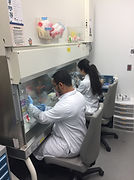The Piccirillo Laboratory is a McGill University affiliated lab situated at the new McGill University Health Centre super-hospital in Montreal, Canada. We offer training programs at both the undergraduate and graduate levels with the department of Microbiology and Immunology at McGill University.
The Research Program
Dr. Piccirillo's research program specializes in the regulation of immune responses mediated by Foxp3+ regulatory T cells, a unique population of CD4+ T cells with potent immunosuppressive functions in humans and mice, and responsible for self-tolerance and immune homeostasis.
The over-arching objective of the Piccirillo program is to determine whether developmental, homeostatic or functional deficiencies or enhancements in Foxp3+ regulatory T cells modulate the onset or magnitude of normal or pathologic immune responses.
His research primarily focuses on mapping the functional dynamics of Foxp3+ regulatory T cells in humans and mouse models of autoimmunity, chronic inflammatory diseases and infections. In addition, the Piccirillo lab has ongoing studies assessing the impact of specific inheritable mutations in the human FOXP3 gene associated with multi-organ autoimmunity in humans, on the genetic programming of FOXP3+ regulatory T cell development and function.
The Piccirillo lab has extensive experience with the development and use of mouse models of autoimmunity, infections and chronic inflammatory disorders, multi-parametric assays for the phenotype and function of T lymphocyte, molecular manipulation and engineering of T cells, and multi-color flow cytometry.
The 4 major themes of the Piccirillo research program are:
-
Dissecting the mechanisms of transcriptional and translational regulation of gene expression in murine or human CD4+ T cell effector or regulatory subsets.
-
Mapping the dynamics of Foxp3+ regulatory T cell function in lymphoid and non-lymphoid tissues in mouse models of autoimmunity, chronic inflammatory diseases and infections.
-
Monitoring Foxp3+ regulatory T cell responses in human autoimmune and inflammatory disorders.
-
Identification of novel biomarkers of inflammatory/non-inflammatory immune responses that can be used to establish disease stages, stratify human cohorts based on these clinically-defined stages, and monitor the therapeutic efficacy of known/novel therapies.









